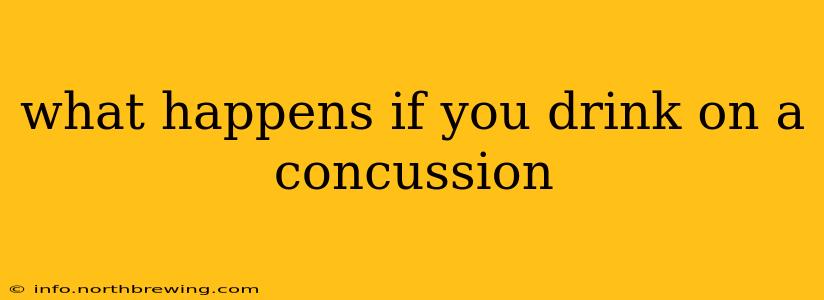A concussion is a traumatic brain injury (TBI) caused by a bump, blow, or jolt to the head or body that causes the brain to move rapidly back and forth inside the skull. This sudden movement can cause the brain to bounce against or twist around the inside of the skull, resulting in a temporary disruption of brain function. Drinking alcohol after suffering a concussion can significantly worsen the injury and prolong recovery. Let's delve into the potential consequences.
What are the effects of alcohol on concussion recovery?
Alcohol is a central nervous system depressant. This means it slows down brain activity. After a concussion, your brain is already struggling to function optimally. Adding alcohol further impairs brain function, hindering the healing process. The effects can range from mild to severe.
Can alcohol delay concussion recovery?
Yes, absolutely. Alcohol can significantly delay concussion recovery. The brain needs time to repair itself after a concussion, and alcohol interferes with this process. It can prolong symptoms like headaches, dizziness, fatigue, and cognitive difficulties (memory problems, difficulty concentrating).
Does alcohol increase the risk of complications from a concussion?
Drinking alcohol after a concussion increases the risk of several complications. These include:
- Increased inflammation: Alcohol can exacerbate the inflammation in the brain already caused by the concussion, leading to prolonged symptoms and potentially more severe consequences.
- Prolonged cognitive impairment: Alcohol's impact on brain function can worsen cognitive problems like memory loss and difficulty concentrating, hindering recovery.
- Increased risk of second impact syndrome: In rare cases, a second concussion before the first has fully healed can lead to second-impact syndrome, a potentially life-threatening condition. Alcohol can further increase the vulnerability to this.
- Increased risk of seizures: While rare, alcohol can increase the risk of seizures, especially in individuals with pre-existing conditions or vulnerabilities.
- Masked symptoms: Alcohol can mask symptoms, making it difficult to accurately assess the severity of the concussion and monitor recovery progress. This can lead to delayed or inadequate treatment.
How long should you avoid alcohol after a concussion?
There's no definitive timeframe, as recovery varies greatly from person to person. However, it's generally recommended to completely abstain from alcohol for at least several weeks, and possibly longer, especially until all symptoms have resolved and you've received medical clearance from a doctor. Your doctor can provide personalized guidance based on your specific situation and recovery progress.
What are the signs and symptoms of a concussion?
Recognizing the signs and symptoms of a concussion is crucial for appropriate management and recovery. These can vary from person to person and may include:
- Headache or pressure in the head
- Nausea or vomiting
- Balance problems or dizziness
- Double vision or blurry vision
- Sensitivity to light or noise
- Feeling sluggish, hazy, foggy, or groggy
- Confusion, difficulty concentrating, or memory problems
- Ringing in the ears
- Sleep disturbances
Should I seek medical attention after a head injury?
Yes, absolutely. Even if symptoms seem mild, it's crucial to seek medical attention after any head injury. A medical professional can properly assess the severity of the concussion, rule out other injuries, and provide appropriate guidance on recovery.
This information is for educational purposes only and should not be considered medical advice. Always consult with a healthcare professional for any health concerns or before making any decisions related to your health or treatment.
